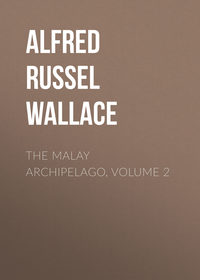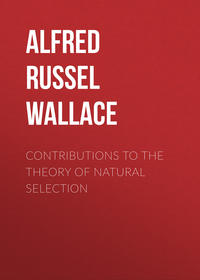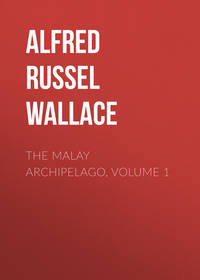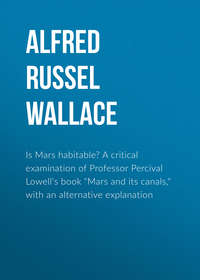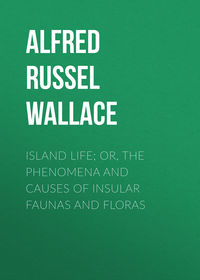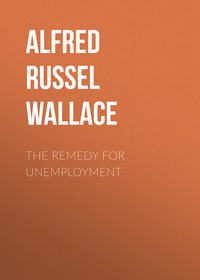 полная версия
полная версияTravels on the Amazon
About a fortnight before each festa—which is always on a Saint's day of the Roman Catholic Church—a party of ten or a dozen of the inhabitants go round, in a canoe, to all the sitios and Indian villages within fifty or a hundred miles, carrying the image of the saint, flags, and music. They are entertained at every house, the saint is kissed, and presents are made for the feast; one gives a fowl, another some eggs or a bunch of plantains, another a few coppers. The live animals are frequently promised beforehand for a particular saint; and often, when I have wanted to buy some provisions, I have been assured that "that is St. John's pig," or that "those fowls belong to the Holy Ghost."
Bidding adieu to the Commandante, Senhor Tenente Antonio Filisberto Correio de Araujo, who had treated me with the greatest kindness and hospitality, I proceeded on to Guia, where I arrived about the end of April, hoping to find Senhor L. ready, soon to start for the river Uaupés; but I was again doomed to delay, for a canoe which had been sent to Barra had not yet returned, and we could not start till it came. It was now due, but as it was manned by Indians, only who had no particular interest in hurrying back, it might very well be a month longer. And so it proved, for it did not arrive till the end of May. All that time I could do but little; the season was very wet, and Guia was a poor locality. Fishes were my principal resource, as Senhor L. had a fisherman out every day, to procure us our suppers, and I always had the day's sport brought to me first, to select any species I had not yet seen. In this way I constantly got new kinds, and became more than ever impressed with the extraordinary variety and abundance of the inhabitants of these rivers. I had now figured and described a hundred and sixty species from the Rio Negro alone; I had besides seen many others; and fresh varieties still occurred as abundantly as ever in every new locality. I am convinced that the number of species in the Rio Negro and its tributaries alone would be found to amount to five or six hundred. But the Amazon has most of its fishes peculiar to itself, and so have all its numerous tributaries, especially in their upper waters; so that the number of distinct kinds inhabiting the whole basin of the Amazon must be immense.
CHAPTER X
FIRST ASCENT OF THE RIVER UAUPÉSRapid Current—An Indian Malocca—The Inmates—A Festival—Paint and Ornaments—Illness—São Jeronymo—Passing the Cataracts—Jauarité—The Tushaúa Calistro—Singular Palm—Birds—Cheap Provisions—Edible Ants, and Earthworms—A Grand Dance—Feather Ornaments—The Snake-dance—The Capí—A State Cigar—Ananárapicóma—Fish—Chegoes—Pass down the Falls—Tame Birds—Orchids—Pium͂s—Eating Dirt—Poisoning—Return to Guia—Manoel Joaquim—Annoying Delays.
At length the long-looked for canoe arrived, and we immediately made preparations for our voyage. Fish-hooks and knives and beads were looked out to suit the customers we were going among, and from whom Senhor L. hoped to obtain farinha and sarsaparilla: and I, fish, insects, birds, and all sorts of bows, arrows, blowpipes, baskets, and other Indian curiosities.
On the 3rd of June, at six in the morning, we started. The weather had cleared up a few days before, and was now very fine. We had only two Indians with us, the same who had run away from Javíta, and who had been paid their wages beforehand, so we now made them work it out. Those who had just returned from Barra were not willing to go out again immediately, but we hoped to get plenty on entering the Uaupés. The same afternoon we reached São Joaquim, at the mouth of that river; but as there were no men there, we were obliged to go on, and then commenced our real difficulties, for we had to encounter the powerful current of the overflowing stream. At first some bays, in which there were counter-currents, favoured us; but in more exposed parts, the waters rushed along with such violence, that our two paddles could not possibly move the canoe.
We could only get on by pulling the bushes and creepers and tree-branches which line the margin of the river, now that almost all the adjacent lands were more or less flooded. The next day we cut long hooked poles, by which we could pull and push ourselves along at all difficult points, with more advantage. Sometimes, for miles together, we had to proceed thus,—getting the canoe filled, and ourselves covered, with stinging and biting ants of fifty different species, each producing its own peculiar effect, from a gentle tickle to an acute sting; and which, getting entangled in our hair and beards, and creeping over all parts of our bodies under our clothes, were not the most agreeable companions. Sometimes, too, we would encounter swarms of wasps, whose nests were concealed among the leaves, and who always make a most furious attack upon intruders. The naked bodies of the Indians offered no defence against their stings, and they several times suffered while we escaped. Nor are these the only inconveniences attending an up-stream voyage in the time of high flood, for all the river-banks being overflowed, it is only at some rocky point which still keeps above water that a fire can be made; and as these are few and far between, we frequently had to pass the whole day on farinha and water, with a piece of cold fish or a pacova, if we were so lucky as to have any. All these points, or sleeping places, are well known to the traders in the river, so that whenever we reached one, at whatever hour of the day or night, we stopped to make our coffee and rest a little, knowing that we should only get to another haven after eight or ten hours of hard pulling and paddling.
On the second day we found a small "Sucurujú" (Eunectes murinus), about a yard long, sunning itself on a bush over the water; one of our Indians shot it with an arrow, and when we stayed for the night roasted it for supper. I tasted a piece, and found it excessively tough and glutinous, but without any disagreeable flavour; and well stewed, it would, I have no doubt, be very good. Having stopped at a sitio we purchased a fowl, which, boiled with rice, made us an excellent supper.
On the 7th we entered a narrow winding channel, branching from the north bank of the river, and in about an hour reached a "malocca," or native Indian lodge, the first we had encountered. It was a large, substantial building, near a hundred feet long, by about forty wide and thirty high, very strongly constructed of round, smooth, barked timbers, and thatched with the fan-shaped leaves of the Caraná palm. One end was square, with a gable, the other circular; and the eaves, hanging over the low walls, reached nearly to the ground. In the middle was a broad aisle, formed by the two rows of the principal columns supporting the roof, and between these and the sides were other rows of smaller and shorter timbers; the whole of them were firmly connected by longitudinal and transverse beams at the top, supporting the rafters, and were all bound together with much symmetry by sipós.
Projecting inwards from the walls on each side were short partitions of palm-thatch, exactly similar in arrangement to the boxes in a London eating-house, or those of a theatre. Each of these is the private apartment of a separate family, who thus live in a sort of patriarchal community. In the side aisles are the farinha ovens, tipitís for squeezing the mandiocca, huge pans and earthen vessels for making caxirí, and other large articles, which appear to be in common; while in every separate apartment are the small pans, stools, baskets, redes, water-pots, weapons, and ornaments of the occupants. The centre aisle remains unoccupied, and forms a fine walk through the house. At the circular end is a cross partition or railing about five feet high, cutting off rather more than the semicircle, but with a wide opening in the centre: this forms the residence of the chief or head of the malocca, with his wives and children; the more distant relations residing in the other part of the house. The door at the gable end is very wide and lofty, that at the circular end is smaller, and these are the only apertures to admit light and air. The upper part of the gable is loosely covered with palm-leaves hung vertically, through which the smoke of the numerous wood fires slowly percolates, giving, however, in its passage a jetty lustre to the whole of the upper part of the roof.
On entering this house, I was delighted to find myself at length in the presence of the true denizens of the forest. An old and a young man and two women were the only occupiers, the rest being out on their various pursuits. The women were absolutely naked; but on the entrance of the "brancos" they slipped on a petticoat, with which in these lower parts of the river they are generally provided but never use except on such occasions. Their hair was but moderately long, and they were without any ornament but strongly knitted garters, tightly laced immediately below the knee.
It was the men, however, who presented the most novel appearance, as different from all the half-civilised races among whom I had been so long living, as they could be if I had been suddenly transported to another quarter of the globe. Their hair was carefully parted in the middle, combed behind the ears, and tied behind in a long tail reaching a yard down the back. The hair of this tail was firmly bound with a long cord formed of monkeys' hair, very soft and pliable. On the top of the head was stuck a comb, ingeniously constructed of palm-wood and grass, and ornamented with little tufts of toucans' rump feathers at each end; and the ears were pierced, and a small piece of straw stuck in the hole; altogether giving a most feminine appearance to the face, increased by the total absence of beard or whiskers, and by the hair of the eyebrows being almost entirely plucked out. A small strip of "tururí" (the inner bark of a tree) passed between the legs, and secured to a string round the waist, with a pair of knitted garters, constituted their simple dress.
The young man was lazily swinging in a maqueira, but disappeared soon after we entered; the elder one was engaged making one of the flat hollow baskets, a manufacture peculiar to this district. He continued quietly at his occupation, answering the questions Senhor L. put to him about the rest of the inhabitants in a very imperfect "Lingoa Geral," which language is comparatively little known in this river, and that only in the lower and more frequented parts. As we wanted to procure one or two men to go with us, we determined to stay here for the night. We succeeded in purchasing for a few fish-hooks some fresh fish, which another Indian brought in: and then prepared our dinner and coffee, and brought our maqueiras up to the house, hanging them in the middle aisle, to pass the night there. About dusk many more Indians, male and female, arrived; fires were lighted in the several compartments, pots put on with fish or game for supper, and fresh mandiocca cakes made. I now saw several of the men with their most peculiar and valued ornament—a cylindrical, opaque, white stone, looking like marble, but which is really quartz imperfectly crystallized. These stones are from four to eight inches long, and about an inch in diameter. They are ground round, and flat at the ends, a work of great labour, and are each pierced with a hole at one end, through which a string is inserted, to suspend it round the neck. It appears almost incredible that they should make this hole in so hard a substance without any iron instrument for the purpose. What they are said to use is the pointed flexible leaf-shoot of the large wild plantain, triturating with fine sand and a little water; and I have no doubt it is, as it is said to be, a labour of years. Yet it must take a much longer time to pierce that which the Tushaúa wears as the symbol of his authority, for it is generally of the largest size, and is worn transversely across the breast, for which purpose the hole is bored lengthways from one end to the other, an operation which I was informed sometimes occupies two lives. The stones themselves are procured from a great distance up the river, probably from near its sources at the base of the Andes; they are therefore highly valued, and it is seldom the owners can be induced to part with them, the chiefs scarcely ever. I here purchased a club of hard red wood for a small mirror, a comb for half-a-dozen small fish-hooks, and some other trifling articles.
A portion only of the inhabitants arrived that night, as when traders come they are afraid of being compelled to go with them, and so hide themselves. Many of the worst characters in the Rio Negro come to trade in this river, force the Indians, by threats of shooting them, into their canoes, and sometimes even do not scruple to carry their threats into execution, they being here quite out of reach of even that minute portion of the law which still struggles for existence in the Rio Negro.
We passed the night in the malocca, surrounded by the naked Indians hanging round their fires, which sent a fitful light up into the dark smoke-filled roof. A torrent of rain poured without, and I could not help admiring the degree of sociality and comfort in numerous families thus living together in patriarchal harmony. The next morning Senhor L. succeeded in persuading one Indian to earn a "saía" (petticoat) for his wife, and embark with us, and so we bade adieu to Assaí Paraná (Assaí river). On lifting up the mat covering of our canoe, I found lying comfortably coiled up on the top of my box a fine young boa, of a species of which I possessed two live specimens at Guía: he had probably fallen in unperceived during our passage among the bushes on the river-side. In the afternoon we reached another village, also situated up a narrow igaripé, and consisting of a house and two maloccas at some distance from it. The inhabitants had gone to a neighbouring village, where there was caxirí and dancing, and two women only were left behind with some children. About these houses were several parrots, macaws, and curassow-birds, which all these Indians breed in great numbers. The next day we reached Ananárapicóma, or "Pine-apple Point," the village where the dance was taking place. It consisted of several small houses besides the large malocca, many of the Indians who have been with traders to the Rio Negro imitating them in using separate dwellings.
On entering the great malocca a most extraordinary and novel scene presented itself. Some two hundred men, women, and children were scattered about the house, lying in the maqueiras, squatting on the ground, or sitting on the small painted stools, which are made only by the inhabitants of this river. Almost all were naked and painted, and wearing their various feathers and other ornaments. Some were walking or conversing, and others were dancing, or playing small fifes and whistles. The regular festa had been broken up that morning; the chiefs and principal men had put off their feather head-dresses, but as caxirí still remained, the young men and women continued dancing. They were painted over their whole bodies in regular patterns of a diamond or diagonal character, with black, red, and yellow colours; the former, a purple or blue black, predominating. The face was ornamented in various styles, generally with bright red in bold stripes or spots, a large quantity of the colour being applied to each ear, and running down on the sides of the cheeks and neck, producing a very fearful and sanguinary appearance. The grass in the ears was now decorated with a little tuft of white downy feathers, and some in addition had three little strings of beads from a hole pierced in the lower lip. All wore the garters, which were now generally painted yellow. Most of the young women who danced had besides a small apron of beads of about eight inches by six inches, arranged in diagonal patterns with much taste; besides this, the paint on their naked bodies was their only ornament; they had not even the comb in their hair, which the men are never without.
The men and boys appropriated all the ornaments, thus reversing the custom of civilised countries and imitating nature, who invariably decorates the male sex with the most brilliant colours and most remarkable ornaments. On the head all wore a coronet of bright red and yellow toucans' feathers, set in a circlet of plaited straw. The comb in the hair was ornamented with feathers, and frequently a bunch of white heron's plumes attached to it fell gracefully down the back. Round the neck or over one shoulder were large necklaces of many folds of white or red beads, as well as the white cylindrical stone hung on the middle of a string of some black shining seeds.
The ends of the monkey-hair cords which tied the hair were ornamented with little plumes, and from the arm hung a bunch of curiously-shaped seeds, ornamented with bright coloured feathers attached by strings of monkeys' hair. Round the waist was one of their most valued ornaments, possessed by comparatively few,—the girdle of onças' teeth. And lastly, tied round the ankles were large bunches of a curious hard fruit, which produce a rattling sound in the dance. In their hands some carried a bow and a bundle of curabís, or war-arrows; others a murucú, or spear of hard polished wood, or an oval painted gourd, filled with small stones and attached to a handle, which, being shaken at regular intervals in the dance, produced a rattling accompaniment to the leg ornaments and the song.
The wild and strange appearance of these handsome, naked, painted Indians, with their curious ornaments and weapons, the stamp and song and rattle which accompanies the dance, the hum of conversation in a strange language, the music of fifes and flutes and other instruments of reed, bone, and turtles' shells, the large calabashes of caxirí constantly carried about, and the great smoke-blackened gloomy house, produced an effect to which no description can do justice, and of which the sight of half-a-dozen Indians going through their dances for show, gives but a very faint idea.
I stayed looking on a considerable time, highly delighted at such an opportunity of seeing these interesting people in their most characteristic festivals. I was myself a great object of admiration, principally on account of my spectacles, which they saw for the first time and could not at all understand. A hundred bright pairs of eyes were continually directed on me from all sides, and I was doubtless the great subject of conversation. An old man brought me three ripe pine-apples, for which I gave him half-a-dozen small hooks, and he was very well contented.
Senhor L. was conversing with many of the Indians, with whom he was well acquainted, and was arranging with one to go up a branch of the river, several days' journey, to purchase some salsa and farinha for him. I succeeded in buying a beautiful ornamented murucú, the principal insignia of the Tushaúa, or chief. He was very loth to part with it, and I had to give an axe and a large knife, of which he was much in want. I also bought two cigar-holders, about two feet long, in which a gigantic cigar is placed and handed round on these occasions. The next morning, after making our payments for the articles we had purchased, we went to bid our adieus to the chief. A small company who had come from some distance were taking their leave at the same time, going round the great house in Indian file, and speaking in a muttering tone to each head of a family. First came the old men bearing lances and shields of strong wicker-work, then the younger ones with their bows and arrows, and lastly the old and young women carrying their infants and the few household utensils they had brought with them. At these festivals drink alone is provided, in immense quantities, each party bringing a little mandiocca-cake or fish for its consumption, which, while the caxirí lasts, is very little. The paint on their bodies is very durable, for though they never miss washing two or three times a day, it lasts a week or a fortnight before it quite disappears.
Leaving Ananárapicóma, we arrived the same evening at Mandii Paraná, where there was also a malocca, which, owing to the great rise of the river, could only be reached by wading up to the middle through the flooded forest. I accordingly stayed to superintend the making of a fire, which the soaking rain we had had all the afternoon rendered a somewhat difficult matter, while Senhor L. went with an Indian to the house to arrange some "negocio" and obtain fish for supper. We stayed here for the night, and the next morning the Indians came down in a body to the canoe, and made some purchases of fish-hooks, beads, mirrors, cloth for trousers, etc., of Senhor L., to be paid in farinha, fowls, and other articles on our return. I also ordered a small canoe as a specimen, and some sieves and fire-fanners, which I paid for in similar trifles; for these Indians are so accustomed to receive payment beforehand, that without doing so you cannot depend upon their making anything. The next day, the 12th of June, we reached Sâo Jeronymo, situated about a mile below the first and most dangerous of the Falls of the Uaupés.
For the last five days I had been very ill with dysentery and continual pains in the stomach, brought on, I believe, by eating rather incautiously of the fat and delicious fish, the white Pirahiba or Laulau, three or four times consecutively without vegetable food. Here the symptoms became rather aggravated, and though not at all inclined to despond in sickness, yet as I knew this disease to be a very fatal one in tropical climates, and I had no medicines or even proper food of any kind, I certainly did begin to be a little alarmed. The worst of it was that I was continually hungry, but could not eat or drink the smallest possible quantity of anything without pains of the stomach and bowels immediately succeeding, which lasted several hours. The diarrhœa too was continual, with evacuations of slime and blood, which my diet of the last few days, of tapioca-gruel and coffee, seemed rather to have increased.
I remained here most of the day in my maqueira, but in the afternoon some fish were brought in, and finding among them a couple of new species, I set to work figuring them, determined to let no opportunity pass of increasing my collections. This village has no malocca, but a number of small houses; having been founded by the Portuguese before the Independence. It is pleasantly situated on the sloping bank of the river, which is about half a mile wide, with rather high land opposite, and a view up to the narrow channel, where the waters are bounding and foaming and leaping high in the air with the violence of the fall, or more properly rapid.
There was a young Brazilian "negociante" and his wife residing in this village, and as he was also about ascending the river to fetch farinha, we agreed to go together. The next morning we accordingly started, proceeding along the shore to near the fall, where we crossed among boiling foam and whirling eddies, and entered into a small igaripé, where the canoe was entirely unloaded, all the cargo carried along a rugged path through the forest, and the canoe taken round a projecting point, where the violence of the current and the heaving waves of the fall render it impossible for anything but a small empty obá to pass, and even that with great difficulty.
The path terminated at a narrow channel, through which a part of the river in the wet season flows, but which in the summer is completely dry. Were it not for this stream, the passage of the rapids in the wet season would be quite impossible; for though the actual fall of the water is trifling, its violence is inconceivable. The average width of the river may be stated at near three times that of the Thames at London; and it is in the wet season very deep and rapid. At the fall it is enclosed in a narrow sloping rocky gorge, about the width of the middle arch of London Bridge, or even less. I need say no more to prove the impossibility of ascending such a channel. There are immense whirlpools which engulf large canoes. The waters roll like ocean waves, and leap up at intervals, forty or fifty feet into the air, as if great subaqueous explosions were taking place.
Presently the Indians appeared with our canoe, and, assisted by a dozen more who came to help us, pulled it up through the shallows, where the water was less violent. Then came another difficult point; and we plunged again into the forest with half the Indians carrying our cargo, while the remainder went with the canoe. There were several other dangerous places, and two more disembarkations and land carriages, the last for a considerable distance. Above the main fall the river is suddenly widened out into a kind of a lake, filled with rocky islands, among which are a confusion of minor falls and rapids. However, having plenty of Indians to assist us, we passed all these dangers by a little after midday, and reached a malocca, where we stayed for the afternoon repairing the wear and tear of the palm-mats and toldas, and cleaning our canoe and arranging our cargo, ready to start the next morning.



